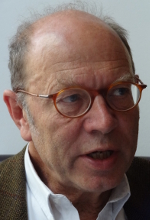Poetry of the Space In Between (pp. 68-83; DOI: 10.23692/iMex.17.5)
 Loading...
Loading...Prof. Dr. Wolfgang Müller-Funk

Wolfgang Müller-Funk is a literary scholar, cultural philosopher, essayist, and lyricist. He studied German language and literature, history, philosophy and Spanish in Munich. He was a Professor of Cultural Studies at the Universities of Birmingham (UK) and Vienna, since 2004 numerous visiting professorships and research stays. in India, Ireland, Croatia, the USA, Germany and Italy. International teaching and research in 2019 in Oslo, Zagreb, Brno, Roma Sapienza, Thessaloniki and Vienna. Research interests: Cultural Theory, Narratology, Central European Studies and Austrian Literature, Romanticism and Avant-Garde, Essay Studies. 2013 Ehrenkreuz of the Republic of Austria for Science and Art. He lives in Drosendorf / Lower Austria, Vienna and Cerovica / Istria. Head of numerous research projects (since 1998) and (co-)publisher of international anthologies. Monographs: Theorien des Fremden (2016), Das Unbehagen in der Kultur (2016), Die Dichter der Philosophen (2013), The Architecture of Modern Culture (2012), Joseph Roth (2012), Kulturtheorie (2006/2010), Komplex Österreich (2009).
https.//wolfgangmuellerfunk.wordpress.com/
The discourse about borders, frontiers and all sorts of liminal phenomena, including transbordering or border-crossing, seems to be older than the current one on globalization and post-colonialism. The idea that globalization will wipe out all borders and limitations is problematic, and the strange, a result of cultural construction, will not disappear. Borders are never only limes, borders, fences, or walls, but at the same time they are also spaces between contact zones. Human space is always constructed by limitation; it means separation and connection at once. Drawing on Bachelard’s Poetics of Space, I will outline a poetry of a space in between, of different modes of limitations, such as the threshold, the bridge, the door, the wall, the fence, and the barrier. Starting from the “real” spatial aspect, I will differentiate between three different kinds of in-between situations that are related to practices of crossing over: phenomena of entering and initiation; transgression; and the idea of overcoming on the vertical plane. I will conclude the article with an analysis of a film about various liminal dimensions, Iñárritu’s film Babel, which does not expose a great narrative of globalization, but it introduces the global world as an obscurely intertwined network of small narratives.
El discurso sobre fronteras y todo tipo de fenómenos liminales, incluyendo el cruzar fronteras y transfronterismos, parece más antiguo que el discurso actual sobre la globalización y el poscolonialismo. La idea que la globalización eliminará todas las fronteras y limitaciones es problemática, ya que lo extraño, resultado de construcciones culturales, no desaparecerá. Las fronteras no son nunca solamente limes, fronteras, vallas, o murallas, sino son, al mismo tiempo, espacios entre zonas de contacto. El espacio humano es siempre construido a través de la limitación y significa separación y conexión a la vez. Basándome en La poética del espacio de Bachelard, esbozaré una poética del espacio en medio, de diferentes modos de limitación, como lo son el umbral, el puente, la puerta, el muro, la cerca, y la barrera. Empezando por el aspecto espacial “real”, destinguiré entre tres diferentes situaciones entremedias que son relacionadas a las prácticas de cruzar: los fenómenos de entrar e iniciar; la transgresión; y la idea de superar en el nivel vertical. Vincularé estas consideraciones centralmente con el análisis fílmico de Babel, de Iñárritu, y con sus varias dimensiones liminales. Babel no expone una gran narración de la globalización, pero introduce el mundo global como una red de narraciones pequeñas que están entrelazadas de manera confusa.
Articles
Anja Bandau – Borderlands revisited
Marisa Belausteguigoitia – Action as deferment
Heidi Denzel de Tirado – Pantelion’s Transborderscapes
Wolfgang Müller-Funk – Poetry of the Space in Between
Romana Radlwimmer – Fenomenología del cruce
Daniel Schreiner– Chicano Marxist and Catholic Thought
María Socorro Tabuenca Córdoba – Wet Minds
Maria Wiehe – Transborder Way of Narrating Identity
Impressions
INVASORIX – Me duele la cara por ser tan güerx
Verena Melgarejo Weinandt – Nepantleras fotografiando
Laura Varela – Segundo de Febrero
Reviews


